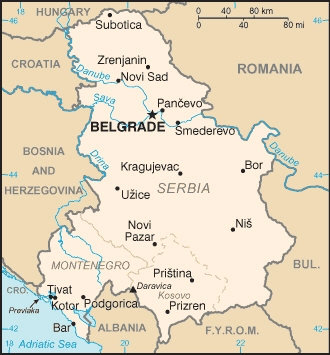While some of these lines are written, we are flying over the Vojvodina and the Hungarian plains. A huge, flat area. Over hundreds of years the East and the West has come through here, Huns, Turks, Slavs, Germans. They have fought, they have settled, they have moved out, they have left their imprints in the local culture. The Balkans are the link between the “West” and the “Near East”, and when Europe discusses whether Turkey is part of Europe or not, the Balkans are the gatekeepers of Europe for centuries.
Another trip through the country. We are on our way home to Germany and France, starting out in Belgrade by car through the Vojvodina. The route is called E75 and sounds like a highway. In some parts it is, two lanes in one direction. But sometimes it is not, and you arrive at a street crossing. To the right, some cows walk slowly on the side of the road. To the left, a horse cart rides on the road. Behind it, the construction of a Rodic superstore. This is close to the Rodic brewery, the most modern in Europe.

|
The dark earth of Vojvodina is one of the richest soils in Europe. All flat, it is ideal for agriculture. And agriculture is one of the most important export articles of Serbia, be it Paprika or raspberries. This gives the country also a very rich selection in fruit juices, in a very high quality and at reasonable prices. Orange juice – imported – is the entry level product. With a Serbian colleague, I was in the west. She wanted a blueberry juice to drink, a quite usual request in Serbia, and very amazed when I explained her that in the West, this is a very expensive drink and available only in very fancy restaurants … Also, the existence of many farmers is build on berries and fruit. In a normal year, a farmers family might earn 5000 Euro with raspberries, and this is a very good earning here.
The Vojvodina ends with the Danube, then start the hilly regions and mountains of central Serbia. Also here farming is everywhere, but the soil is less fertile. You can find shepherds and sheep strolling around. An old lady guarding one cow on the side of the road. Time has not changed very much for the last several hundred years, wouldn’t it be for the cars and tractors who seem to be around only for the last 30 years …
A separate part of the country is Montenegro. An independent state, linked in a union with Serbia. What does union mean? Well, there is only one army and there is one president. Besides that, there are two currencies: Montenegro uses the Euro and Serbia the Dinar. Montenegro has VAT, Serbia still Sales tax. Customs are different. Serbian banks cannot operate in Montenegro. Sending merchandise from Serbia to Montenegro is more complicated than sending it to Tahiti – and of course a Montenegrin company cannot simply pay a Serbian supplier without going over a third country.
|
Talking complicated, Kosovo could be added. Legally part of Serbia, it is under UN control. Kosovo uses the Euro, has their own customs system, uses VAT … Well, doing business with Kosovo is mostly done by having the Kosovars come to Serbia and selling against cash, and let them worry with their customs their own way …But, the EU taxpayer should know that there are 50 000 of their soldiers in Kosovo and that the expenses of the EU and their troops are the basis of the economy down there. 2 million people without serious work, some people call it already the Westbank of Europe. Problem to be watched if stability on the Balkans is still on the menu of European politics.
And if someone is interested in states with unclear statuses in Europe, Serbian Republic could be added. Officially, it belongs to Bosnia. They still use the German mark, or some local copy of it. So for those who think the Euro is a bad thing, they are invited to invest there money there, and they will for sure be very welcome!
<< Index
>>
Upd. on
04. févr. 2007
